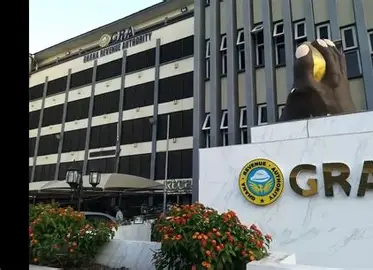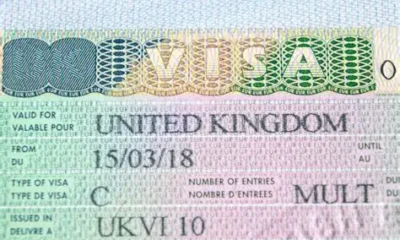NEWS
Modified Taxation Scheme has taken off
Published
5 months agoon
By
Desert Man
The Ghana Revenue Authority (GRA) is expected to implement key policies in the country’s tax administration laws from July 1, 2025 to boost domestic revenue drive for the government.
These include the Modified Taxation Scheme, VAT on Real Estate and VAT on Non-Life Insurance.
The Modified Taxation Scheme (MTS) is a simplified approach for informal sector and it introduces a flexible framework targeting micro small and medium businesses across the country.
This is in line with the Income Tax Act, 2015 (Act 896).
Mr Anthony Kwasi Sarpong, Acting Commissioner-General of the GRA in a media engagement said the scheme was not an additional tax but a simplified method of calculating personal income tax for eligible traders and entrepreneurs.
“We as GRA are tax implementors and as the President has announced and reiterated by the Minister of Finance, the country must mobilise more revenue so that we can take care of critical budgetary allocations,” he said.
He said what GRA needed to do was to look at the existing revenue handles and implement it to the letter.
“We believe that if we are able to do these, then we can seal many of the revenue loopholes that are being closed onto us as a country,” he added.
The Commissioner-General assured stakeholders that these were not new taxes and it was not intended to overburden Ghanaians but rather to support the resetting of the economy.
Key Highlights of the Scheme include Ghanaian residents earning income solely from business activities within the country, Presumptive Tax Based on Installments (PTI): Fixed quarterly payments (up to GH¢45) for businesses with an annual turnover below GH¢20,000.
Other are Presumptive Tax Based on Turnover (PTT): A flat 3 per cent rate for businesses earning between GH¢20,000 and GH¢500,000 annually, a Modified Cash Basis (MCB): For businesses exceeding GH¢20,000, applying graduated rates with allowable deductions.
The rest are Multiple payment options, including mobile money, USSD codes (*222#), and bank deposits and Simplified registration via GRA offices or a dedicated mobile app.
He said alongside the Modified Taxation Scheme, GRA was implementing several other strategic initiatives designed to plug revenue leakages and broaden the tax base.
These measures form part of the government’s comprehensive strategy to reduce reliance on debt financing and strengthen domestic revenue mobilization.
Mr. Sarpong said the Special Voluntary Disclosure Program (SVDP), which was rolled out in 2024, was being deepened.
It was an initiative that sought to give expression to the income tax law and resident persons who earn incomes abroad.
He said this program provided an opportunity to these persons to voluntarily disclose incomes earned abroad, which they have not paid tax on without incurring penalties.
He said VAT on the Rental of Immovable Property and the Supply of Immovable Property by Estate Developers would also be implemented in accordance with the provisions of the Value Added Tax (VAT) Amendment Act, 2023 (Act 1107), all estate developers are to charge VAT on the supply of immovable property.
The Estate developers must charge a 5 per cent VAT on: immovable property by an estate developer calculated on the taxable supply, immovable property for rental purposes, other than for accommodation in a dwelling or a commercial rental establishment and 1 per cent COVID -19 levy was also applicable on the supply of immovable property.
Additionally, an appointed withholding agent who fails to charge and account for the tax to the Commissioner-General by the 15th of the month following the due date shall be liable to pay the VAT that should have been withheld, along with a penalty of thirty percent (30 per cent) of the amount.
He said there were exemptions for residential dwellings and agricultural properties
The Commissioner-General said as stipulated in VAT (Amendment) Act, 2023 (Act 1107) insurance premiums covered for VAT purposes include fire, marine, liability, property, indemnity, engineering, travel, burglary, personal accident and workmen’s compensation insurance.
He said insurance companies must take note and charge a 15 per cent VAT on all insurance premiums covered under this provision.
Mr. Sarpong said to make the implementation more effective, the companies were expected to update their accounting and invoicing systems to incorporate the VAT; train staff on the application and reporting on the VAT; communicate proactively with clients about the changes; and ensure timely registration for VAT, if not already registered.
He said the combination of these measures represented a balanced approach to revenue generation.
The Authority is, therefore creating multiple pathways for compliance while ensuring critical sectors contribute their fair share.
GNA
You may like
-


Wontumi, Akonta Mining Seek Court Order for Full Prosecution Disclosures
-


Central Regional Minister Hints at Staff Shake-Up at Awutu Senya East Assembly
-


GMet Warns of Localised Thunderstorms Across Accra and Key Cities Today
-


Ghana’s Current Account Surges as Cedi Strengthens in 2025
-


Black Stars Land in Pot 4 for 2026 World Cup Draw as Tough Opponents Await
-


Court Battle Over Daddy Lumba’s Nationality Sparks New Twist in Widowhood Dispute
-


UK Slaps 10-Year Visa Ban on 1,632 Ghanaians as Global Campaign Targets Fraud
-


Otumfuo Leads Final Bid to End the Bawku Conflict as Historic Mediation Nears Climax
-


Kasoa–Winneba Road to Be Completed by June 2026, Says Roads Minister

















